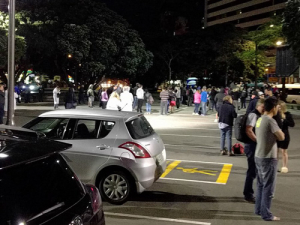Post-quake study reveals hort potential
Large areas of North Canterbury and South Marlborough – affected by the 2016 Kaikoura Earthquakes – offer wide potential for horticulture.
 Worried people in Wellington fill a downtown carpark after the quake on early Monday morning. Photo: @nkpnz on Twitter.
Worried people in Wellington fill a downtown carpark after the quake on early Monday morning. Photo: @nkpnz on Twitter.
I have lived in and around Wellington all my life and I have never experienced an earthquake as big and as frightening as this latest one.
But interestingly some things haven’t changed. Once again the windows fell out of the old Dominion Farmers building on the corner of Featherston and Balance St, just opposite where HortNZ is now based. I can recall windows from that building dropping out one Saturday night 40 years ago when I was working at TV-1 when the studios were based in nearby Waring Taylor St. In those days that building housed MAF’s head office. Every time there is an earthquake the windows go and it’s a miracle that over the years no one has been killed or injured
Further down Featherston St the building where Federated Farmers used to be based, Agriculture House, a similar thing happened 40 years ago and it happened again this week.
MPI’s ‘new’ building has also been out of action for the last two days as have Beef+Lamb NZ and Feds. The latter two are now back in operation.
On the waterfront the ‘new’ Greater Wellington Regional Council (GWRC) offices are uninhabitable because of quake damage. They moved there a few years ago when their other building was damaged in 2013 and declared an earthquake risk. It seems the GWRC aren’t great at picking safe buildings.
This quake serves to point out the vulnerability of Wellington. It has been damaged in recent years by the Seddon and now the Kaikoura quake but it has yet to suffer the so called ‘big-one’. And let’s not forget the floods that added to everyone’s woes this week. Many agri related organisations are located in high rise buildings in the capital and this latest quake is a reminder, if ever one was needed, about the need to have good back-up and contingency plans.
This latest quake showed how a small town like Kaikoura can become quickly isolated. Wellington is similarly vulnerable only on larger scale.
Dairy Women's Network (DWN) has announced that Taranaki dairy farmer Nicola Bryant will join its Trust Board as an Associate Trustee.
Rural Women New Zealand (RWNZ) says it welcomes the release of a new report into pay equity.
Red meat exports to key quota markets enjoyed $1.4 billion in tariff savings in the 2024-25 financial year.
Remediation NZ (RNZ) has been fined more than $71,000 for discharging offensive odours described by neighbours as smelling like ‘faecal and pig effluent’ from its compositing site near Uruti in North Taranaki.
Two kiwifruit orchards in the Bay of Plenty and one in Northland are this year's finalists for the Ahuwhenua Trophy competition.
The Government's chief science advisor, Dr John Roche says the key objective for the science sector in the coming year is bedding down the reforms which sees the merger of the previous entities.

OPINION: A mate of yours truly reckons rural Manawatu families are the latest to suffer under what he calls the…
OPINION: If old Winston Peters thinks building trade relations with new nations, such as India, isn't a necessary investment in…